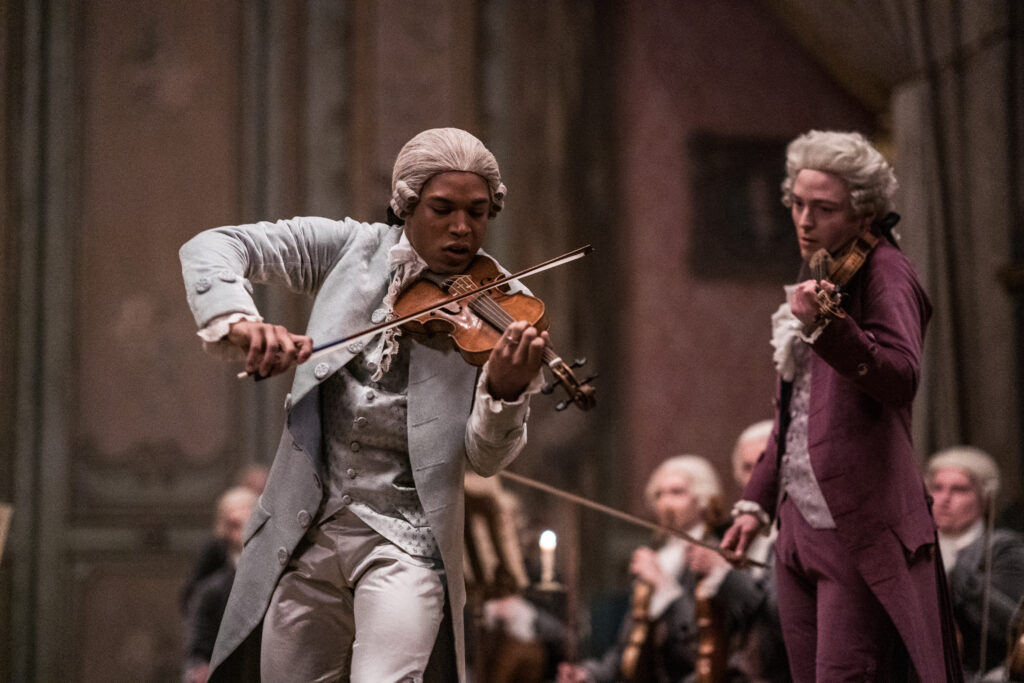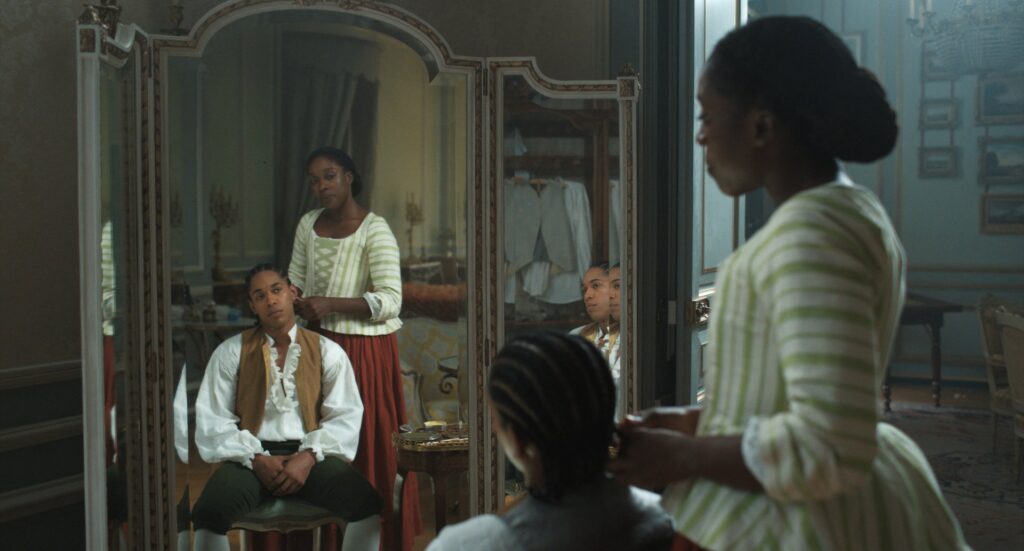April 21, 2023
by Carla Hay

Culture Representation: Taking place in France, from the 1750s to the 1790s, the dramatic film “Chevalier” (a biopic of musician/fencer Joseph Bologne, also known as Chevalier de Saint-Georges) features a predominantly white group of people (with a few black people) representing the working-class, middle-class and royalty.
Culture Clash: Bologne experiences racism, an illicit love affair and treacherous politics in his journey to becoming a celebrated musician and fencer.
Culture Audience: “Chevalier” will appeal primarily to people who are fans of history-based biopics and classical music and don’t mind if a movie set in 1700s France has some modern touches that didn’t exist in that century.

“Chevalier” has its share of corny “only in a movie” moments, but the essential truths of oppression and racial barriers in society have the most resonance in this story. Kelvin Harrison Jr. gives an admirable performance. The costume designs are gorgeous. You don’t have to be fan of classical music to enjoy the movie, but it certainly helps. History purists will be wincing through some of the story, because it’s yet another biopic that takes liberties with facts, in order to make the movie more dramatic.
Directed by Stephen Williams and written by Stefani Robinson (who is one of the producers of the movie), “Chevalier” (which takes place in France, mostly in Paris) tells the story of Joseph Bologne, also known as the Chevalier de Saint-Georges, who lived from 1745 to 1799. He the first black person to conduct a major orchestra in France. He was also renowned for being a champion fencer. The movie depicts Joseph mostly in his 20s, 30s and 40s, but there are flashback scenes to his teens and younger childhood. “Chevalier” had its world premiere at the 2022 Toronto International Film Festival.
The movie tells viewers right from the beginning that Joseph (played as an underage teen and as an adult by Harrison) was so phenomenal, he outshone Wolfgang Amadeus Mozart (played by Joseph Prowen) in concert. The opening scene shows Mozart conducting an orchestra in Paris, sometime in the 1780s, and asking the audience for requests. Joseph confidently strolls into the concert hall and asks to play the violin alongside Mozart.
Mozart looks slightly amused and asks, “Who put you up to this?” Joseph says, “Myself, monsieur.” Mozart calls Joseph a “dark stranger” and smugly says, “I hope this won’t be too embarrassing for you.” They proceed to play the violin, as if it’s a dueling competition of musicianship.
And in the end, Mozart is the one who’s embarrassed, as Joseph proves that he’s the more talented violinist. Joseph is so masterful, the crowd gives him a standing ovation. An infuriated Mozart runs off stage and fumes, “Who the fuck was that?” Clearly, “Chevalier” is not a movie that wants to look historically accurate.
This scene is a perfect example of how “Chevalier” tries but doesn’t always succeed in balancing hokey drama with regal gravitas. It’s a movie with a lot of 1700s pomp and circumstance, but with a modern approach to melodrama that takes viewers out of this time period, especially in a lot of the dialogue that sounds too contemporary. The movie’s messages about racism sometimes get bogged down in too much exposition, but luckily the cast is talented enough to elevate the material.
If some of the scenes in “Chevalier” look over-the-top and fabricated for a movie, that’s because the real life of Bologne did not get a lot of historical documentation. However, you don’t have to be a historian or a classical music expert to know that the opening scene definitely looks fake. Mozart running off stage in humiliation because of a newcomer rival—if it happened in real life—would have gone down in history as one of the most notorious stories about him.
What the movie does depict that is historically accurate is that at the age of 7, Joseph (played by Reuben Anderson) was taken by his white French American father to live in France, where Joseph was educated and lived for the rest of his life. Joseph’s father was a wealthy plantation owner named Georges de Bologne Saint-Georges, and his mother was an enslaved black woman named Nanon, who was originally from Senegal. In real life, Georges de Bologne Saint-Georges lived in the Caribbean archipelago Guadeloupe, which was a colony of France at the time.
The “Chevalier” movie changes the location of Joseph’s birthplace from Guadeloupe to Louisiana. His father’s name has the English-language spelling of George Bologne (played by Jim High), a French American who spends time at his plantations in Louisiana and Guadeloupe. Joseph’s mother Nanon (played by Ronkẹ Adékoluẹjo) is depicted as being originally from Senegal and brought to North America in enslavement, just like in real life. The “Chevalier” filmmakers perhaps made Joseph have a connection to Louisiana because Harrison is American, and his American accent can be heard in much of the dialogue.
Before abandoning his son in France at the private Academie de La Boëssière, George instills the belief in Joseph that Joseph must be the best at anything he does if he is going to survive and succeed. The academy’s owner Tessier de La Boëssière (played by Ben Bradshaw) reluctantly enrolls Joseph in the school and warns George that Joseph people at the school will not be kind to this “Negro bastard.” In real life, Joseph had an older white half-brother named Pierre (they had the same father), who was already enrolled at the academy when Joseph was admitted as a sudent. However, the “Chevalier” movie erases Pierre, probably to make it look more dramatic that Joseph felt isolated by not knowing any at the academy as a new student.
“Chevalier” shows the expected racist bullying that Joseph received throughout his life. But the movie also shows how he achieved greatness, despite many obstacles put in his way. Expect to see several montages of him practicing his music or fencing, as if his life depended on it, because in many ways, his life really did depend on it. Joseph eventually became well-known for his talents and got respect from members of high society.
This notoriety resulted in a volatile friendship with the fun-loving but very spoiled Marie Antoinette (played by Lucy Boynton), the queen of France, who introduced him to powerful members of her inner circle. This inner circle includes Marie’s cousin Philippe (played by Alex Fitzalan), the Duke of Orleans. Philippe becomes Joseph’s close confidant, and their friendship leads to an important political alliance.
As already revealed in the trailer for “Chevalier,” Nanon reunites with Joseph around the time that he becomes a famous musician and a champion fencer. The reunion doesn’t go smoothly at first, because Nanon represents a part of Joseph’s life that he wants to keep in the past. Eventually, Nanaon and Joseph become close when he begins to understand that he should embrace and appreciate his African American heritage.
“Chevalier” is not subtle in its messages about how black people who achieve success in a predominantly white culture have to decide how much “black culture” will be part of their identity when interacting with white people. The way that Joseph chooses to wear his hair in public (African-styled cornrow braids or European-made wigs) is a manifestation/symbol about how much of his “black” or “white” identity that he wants to express.
Some of the best aspects of “Chevalier” have to do with Joseph confronting his “assimilation” into white French society and what that assimilation will cost him, in terms of his self-respect, his relationship with his mother and his career. Joseph has to deal with constant condescension from white people who think that Joseph will never be equal to them, simply because he is not white. Marie Antoinette often treats him like “charity case” who needs her and other white people to “save” him. At one point, Joseph assertively says to her: “Not everything is about you people.”
The movie’s strongest non-musical scenes are those between Joseph and the women in his life: his kind and patient mother Nanon, his unpredictable friend Marie Antoinette, and his conflicted lover Marie-Josephine (played by Samara Weaving), an opera singer who is an unhappy marriage to a cruel and wealthy man named Marquis De Montalembert (played by Marton Csokas). Marie-Josephine was the one who introduced Joseph to her husband, who could immediately sense that there was an attraction between her and Joseph. Privately, Marquis De Montalembert tells Joseph (who has a reputation for being a ladies’ man) that he doesn’t “wish for my Marie-Josephine to become a whore.”
Joseph also has to navigate the power and politics of getting investments for an original opera that he is composing and plans to conduct. Marie-Josephine’s cousin La Guimard (played by Minnie Driver), who is a rich opera singer, expresses interest in being an investor, but she enjoys manipulating Joseph, because she knows she has the financial upper hand. Joseph ends up wanting Marie-Josephine to be the star of his opera. Marquis De Montalembert doesn’t want Marie-Josephine to take the job, for obvious reasons.
Another affluent potential investor is Madame De Genlis (played by Sian Clifford), who believes in Joseph’s talent, but she wants some creative control that he’s reluctant to give. She says she will finance the opera if he bases it on a story that she wrote. Observant viewers will notice that no matter how exceptional Joseph can be, it causes resentment among racist people who will use any excuse to try to tear him down.
“Chevalier” does not make Joseph look like a saint. He can be stubborn and arrogant to a fault. His affair with Marie-Josephine is an example of his selfish recklessness. And even though Joseph thinks he loves Marie-Josephine, it’s pretty obvious that people will get very hurt by this love affair. The movie takes an abrupt turn into some melodrama that comes as a result of this extramarital relationship.
Despite some cringeworthy lines of dialogue in “Chevalier” and occasionally slow pacing of the movie, Harrison holds everything together and keeps things watchable in his intriguing portrayal of this complex character. Boynton has some memorable moments in her performance as the imperious and fickle queen Marie Antoinette. The movie’s costume design by Oliver García and production design by Karen Murphy are truly feasts for the eyes.
The music of “Chevalier” is also noteworthy, including a vibrant original score by Kris Bowers and production and musical arrangements of Bologne’s music by Michael Abels. In terms of overall storytelling, “Chevalier” is no masterpiece. However, the movie has enough compelling moments and good acting to maintain viewer interest in this very dramatic version of an extraordinary and talented life.
Searchlight Pictures released “Chevalier” in U.S. cinemas on April 21, 2023.
